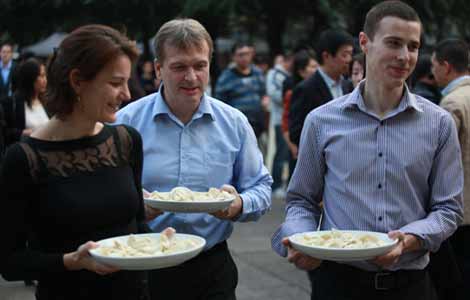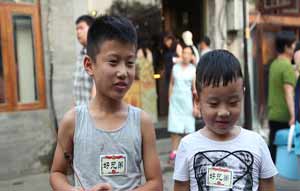Building strategic trust
Updated: 2013-10-15 07:22
By Tao Wenzhao (China Daily)
|
||||||||
China and the United States get closer in regional cooperation in line with a new model of major-country relationship
This year has been an unusual one for China-US relations. Since US President Barack Obama started his second term and China completed a smooth leadership transition, leaders of the two countries have made a firm commitment to building a new model of major-country relationship that has charted a clear course to develop better bilateral relations.
Since the beginning of this year, Obama and President Xi Jinping have met more than once. Visits of other political and military leaders and dialogues between the two sides also tell us that the countries have put into practice the consensus that their top leaders have reached and started the process of building a new model of major-country relations. Both countries have also decided to actively explore a notification mechanism for major military activity.
Foreign Minister Wang Yi met US Secretary of State John Kerry on Sept 19. The next day, at the Brookings Institution, Wang noted in a speech that both countries have been working on strategic reassurance between a rising power and an existing major power. He said that "we have never had the strategic intention to challenge or even replace the United States for its position in the world" and that "we have never thought about pushing the US out of the region".
These statements are plain and straightforward and display genuine sincerity.
The statements are also factual. China has an edge economically, but security-wise it is still weak. With no allies or military bases overseas, China lags far behind the US in terms of military power. China does not have the capacity or intention to challenge the US position. Kerry reassured Wang that it was in US interests to see continued prosperity in China and maintain a partnership with China. He explained that the "rebalancing" strategy was not directed against China.
On the contrary, a strong partnership with China was, in itself, an important part of the "rebalancing" strategy. Statements are important, but actions are more important. It is hoped that Kerry's statements, and similar statements made by other high-ranking US officials, will be translated into actions.
China and the US have more converging interests and frequent interactions in the Asia-Pacific than anywhere else. At the same time, the two countries have come into dispute with one another more often in the Asia-Pacific than in any other region.
China-US relations are extremely important to peace and stability in the region, while regional developments may also impact China-US relations. In fact, the US "rebalancing" strategy has further complicated the security situation in the region.
Just as Wang stressed, the two countries "shoulder increasingly greater common responsibilities" toward the international community, but first and foremost toward the Asia-Pacific region. He went further to suggest that the Asia-Pacific should be turned into a "testing ground" for the new model of major-country relationship.
We have said, for some time, that the Taiwan question was the most important and most sensitive issue in China-US relations, as it encroaches on China's core interests. Now the Taiwan question is still important in bilateral relations but the more pressing issue affecting China-US relations is the way in which the US handles territorial disputes between China and some of its neighboring countries, including disputes over maritime sovereignty, rights and interests.
China has not asked the US for support. It has only asked the US not to interfere or meddle in these issues, or send out confusing, even erroneous signals. These issues are for China and relevant countries to settle through peaceful bilateral negotiations without external interference. This could be a test for the new model of major-country relationship.
To enhance cooperation between the countries is a fundamental way to build the new model of major-country relationship. Through efforts over thirty-odd years, a good foundation for cooperation between China and the US has already been laid. Economically, China and the US have become increasingly interdependent and neither can thrive in isolation of the other. In many bilateral, regional and global issues, the countries have also expanded their cooperation and increased their common interests.
China and the US could cooperate in a number of areas, including the Korean Peninsula nuclear issue, cyber security, climate change, the peace talks between Palestine and Israel, and even on Afghanistan.
To stabilize the situation in Afghanistan, fight terrorism, crack down on drug trafficking and help Afghanistan develop its economy and improve the lives of its people are some of the areas in which China and the US may cooperate. Wang optimistically envisaged China-US cooperation in Afghanistan to be a new highlight in cooperation.
If the two countries expand cooperation to more and more areas and achieve mutually beneficial results through such cooperation, then a new model in major-country relationship will have been established.
The author is a researcher at the Institute of American Studies at the Chinese Academy of Social Sciences. www.chinausfocus.com
(China Daily 10/15/2013 page8)
- China Silicon Valley holds discussion on China-US relations
- Experts examine core values of China and US
- Can China and the US cooperate on fixing Afghanistan?
- China-US college venture focuses on public health
- China-US key to global future: report
- China, US team up on Central Asia
- Korean denuclearization in interest China, US
- China, US vow to enhance Asia-Pacific military ties
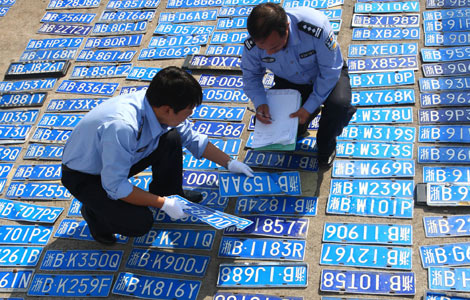
 Storm swamps car insurance firms
Storm swamps car insurance firms
 Smartphone firm rockets into the US
Smartphone firm rockets into the US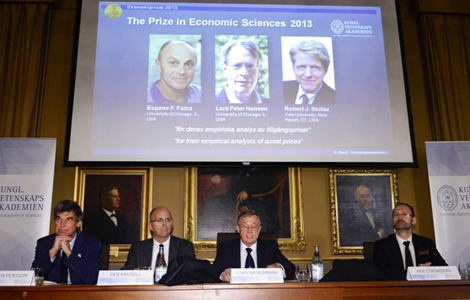
 3 US economists share 2013 Nobel Prize in Economics
3 US economists share 2013 Nobel Prize in Economics
 Canton Fair to promote yuan use
Canton Fair to promote yuan use
 Vintage cars gather in downtown Beijing
Vintage cars gather in downtown Beijing
 Riding the wave of big bargain buy-ups
Riding the wave of big bargain buy-ups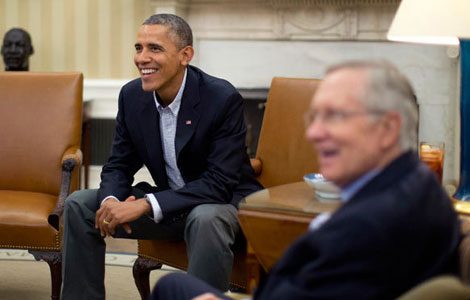
 Senate leads hunt for shutdown and debt deal
Senate leads hunt for shutdown and debt deal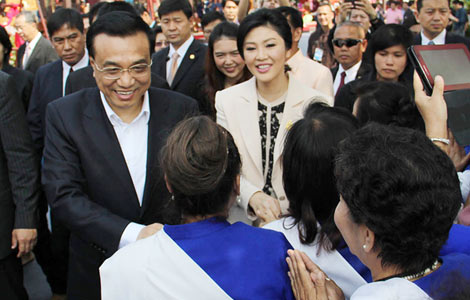
 Chinese education for Thai students
Chinese education for Thai students
Most Viewed
Editor's Picks

|

|

|

|

|

|
Today's Top News
All 86 tourists evacuated from Mount Qomolangma
Obama hopeful as meeting nears with lawmakers
Canton Fair to promote yuan use
Over 380 detained in Moscow riot
86 trapped at Mount Qomolangma camp amid snow
Going green can make good money sense
Window cracks for progress in Iran
Senate leader 'confident' fiscal crisis can be averted
US Weekly

|

|
